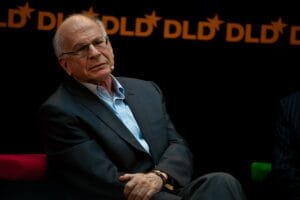After being born in Tel Aviv and growing up in Paris, Kahneman studied psychology, and during his service in the Israeli Defense Forces he developed a structured intake interview for recruits, which the IDF used for decades. In 1958, he moved to the U.S. to get his Ph.D in psychology at the University of California, Berkeley.
But why did he study psychology in the first place? He had to hide while in France during the Nazi occupation; he was 7 or 8 years old, he said in 2002. “Jews were required to wear the Star of David and to obey a 6 p.m. curfew. I had gone to play with a Christian friend and had stayed too late. I turned my brown sweater inside out to walk the few blocks home. As I was walking down an empty street, I saw a German soldier approaching. He was wearing the black uniform that I had been told to fear more than others — the one worn by specially recruited SS soldiers. As I came closer to him, trying to walk fast, I noticed that he was looking at me intently. Then he beckoned me over, picked me up, and hugged me. I was terrified that he would notice the star inside my sweater. He was speaking to me with great emotion, in German. When he put me down, he opened his wallet, showed me a picture of a boy, and gave me some money. I went home more certain than ever that my mother was right: people were endlessly complicated and interesting.”
After receiving his Ph.D and moving around a bit, Kahneman settled principally at Princeton University. He taught, researched, and wrote scholarly papers and books, particularly writing about the psychology of the anchoring effect, the availability heuristic, particularly as it all relates to judgement, which had profound implications. So profound that in 2002 Kahneman won the Nobel Prize in Economics “for having integrated insights from psychological research into economic science, especially concerning human judgment and decision-making under uncertainty.” So profound that in 2013, Kahneman received the U.S.’s highest civilian honor, the Presidential Medal of Freedom, from President Barack Obama. Much of his work was done in collaboration with psychologist Amos Tversky, and was quick to give him much of the credit. But Tversky died in 1996; the Nobel Prize is never awarded posthumously.

“His central message could not be more important,” said Harvard psychologist Steven Pinker, speaking of Kahneman — “namely, that human reason left to its own devices is apt to engage in a number of fallacies and systematic errors, so if we want to make better decisions in our personal lives and as a society, we ought to be aware of these biases and seek workarounds. That’s a powerful and important discovery.” The practical effect of his work: since the days of economist Adam Smith, humans were considered — when it came to economics, at least — “homo economicus” (“economic man”), who is fully rational in their decisions in, say, investing in the stock market. But Kahneman showed that humans instead rely heavily on “intellectual shortcuts” that lead to poor decisions that are decidedly not in their own best interest.
Humans “are much too influenced by recent events,” he said. “They are much too quick to jump to conclusions under some conditions and, under other conditions, they are much too slow to change.” I became aware of him from his very popular and quite readable 2011 book that summarizes most of his research and conclusions, Thinking, Fast and Slow. “Many people are overconfident, prone to place too much faith in their intuitions,” he wrote there. “They apparently find cognitive effort at least mildly unpleasant and avoid it as much as possible.” Dr. Kahneman died March 27, at 90.

This “unsubscribe” left me very curious about who the SS soldier was and what picture did he show Dr. Kahneman? My assumption is that the soldier was a father and was showing young Daniel a picture of his own son.
—
Remember, he was a terrified young boy, so he probably had no idea what the soldier, who could well have been drunk, had in mind. That said, my assumption was the same. -rc
When a verbal language barrier exists, all we have is our body language. So in my mind, it is likely Dr. Kahneman (as a child) was the spitting image of (or at least bore a close resemblance to) this SS soldier’s own child, whom he’d either lost, or had to leave behind during his tour.